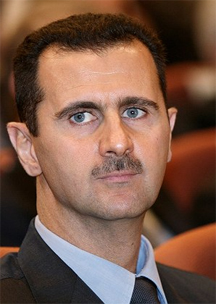BEIRUT (Reuters) – Western states expressed alarm after Syria acknowledged for the first time that it has chemical and biological weapons and said it could use them if foreign countries intervene.

A week of unprecedented fighting inside the capital, Damascus, including a bomb attack that killed four of President Bashar al-Assad’s closest advisers, has transformed the 16-month uprising and dramatically escalated international pressure on Assad.
Damascus residents said the capital was relatively quiet in the early hours of today after a day of fighting that saw government troops storm a neighbourhood.
Defying Arab foreign ministers who on Sunday offered Assad a “safe exit” if he stepped down, the Syrian leader has launched fierce counter-offensives, reflecting his determination to keep power as the uprising enters its most violent phase.
Foreign Ministry spokesman Jihad Makdissi said the army would not use chemical weapons to crush rebels but could use them against forces from outside the country.
“Any chemical or bacterial weapons will never be used … during the crisis in Syria regardless of the developments,” Makdissi said. “These weapons are stored and secured by Syrian military forces and under its direct supervision and will never be used unless Syria faces external aggression.”
Damascus has not signed a 1992 international convention that bans the use, production or stockpiling of chemical weapons, but officials in the past had denied it had any stockpiles. Washington and other Western capitals rushed to warn Syria against making any threats to use such weapons.
“Given the regime’s stockpiles of chemical weapons, we will continue to make it clear to Assad and those around him that the world is watching and that they will be held accountable by the international community and the United States should they make the tragic mistake of using those weapons,” US President Barack Obama said yesterday.
A US State Department spokeswoman said warnings against using chemical weapons extended not only to the Syrian government but to rebels and any militants who might try to obtain them.
Britain, Germany and other countries also said it was unacceptable for Syria to say it might use chemical arms. UN Secretary-General Ban Ki-moon said he was very concerned Syria may be tempted to use unconventional weapons.
Western countries and Israel have expressed fears chemical weapons could fall into the hands of militant groups as Assad’s authority erodes. Israel has publicly discussed military action to prevent Syrian chemical weapons or missiles from reaching Assad’s Lebanese Shi’ite militant allies Hezbollah.
The Global Security website, which collects published intelligence reports and other data, says there are four suspected chemical weapons sites in Syria: north of Damascus, near Homs, in Hama and near the Mediterranean port of Latakia. Weapons it produces include the nerve agents VX, sarin and tabun, it said, without citing its sources.
Abdelbasset Seida, head of the Syrian National Council opposition group, said, “A regime that massacres children and rapes women could use these types of weapons.
“The technical infrastructure may not be suitable, but as I said, such a step could be expected from this murderous regime. The international community must prevent this,” he told reporters after meeting Turkey’s foreign minister in Ankara.
Arab League ministers meeting in Doha urged the opposition and the rebel Free Syrian Army to form a transitional government, Qatari Prime Minister Sheikh Hamad bin Jassim al-Thani told a news conference.
Makdissi rejected the call for Assad to step down as a “flagrant intervention” in Syria’s internal affairs. “We regret that the Arab League stooped to this immoral level,” he said.
US officials said yesterday the Obama administration was shifting its focus from deadlocked UN diplomacy over Syria and preparing to provide additional communications equipment and training to help the Syrian opposition improve its command-and-control capabilities for coordinating its fighters.
Officials insist that Washington has no plans for now to send lethal weapons to Syria’s rebels, a step the White House has publicly ruled out.
Yesterday, the army shelled rebel forces in the northern city of Aleppo and stormed the southern Damascus neighbourhood of Nahr Aisha, breaking into shops and houses and burning some of them, activists said.
Video showed dozens of men in green army fatigues massing in the neighbourhood, which looked completely abandoned. Men carrying machineguns and rocket-propelled grenade launchers knocked and then kicked down doors and climbed through windows.








